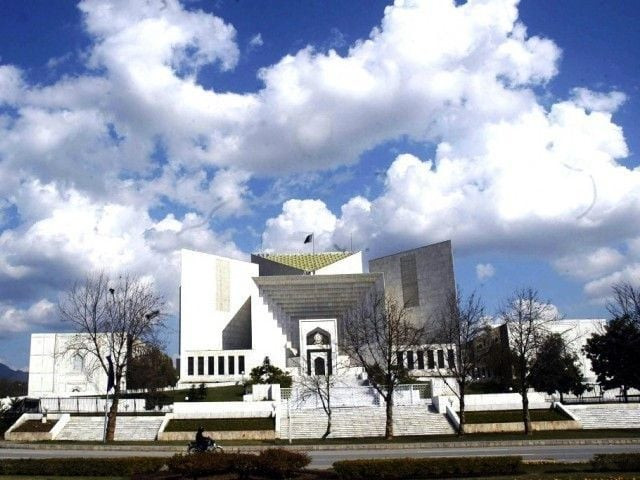Two more SC judges push CJ to call JCP huddle
Bar representatives pass resolution calling for filling five top court vacancies

After Justice Qazi Faez Isa, two other senior Supreme Court judges -- Justice Sardar Tariq Masood and Justice Syed Mansoor Ali Shah -- have urged Chief Justice of Pakistan Umar Ata Bandial to immediately call a meeting of the Judicial Commission of Pakistan (JCP) to consider the appointment of five SC judges, saying that delay in filling the vacancies gave rise to unwarranted rumours of ‘petty politics’.
“We humbly urge you to immediately call the meeting of the JCP so as to honour our constitutional obligation and to uphold our oath under the Constitution,” read a letter written by the two SC judges, both members of the commission, to the CJP, who is also the head of the body.
Copies of the letter have been sent to all JCP members.
Both judges reminded the CJP that in order to swiftly move forward to filling the current vacancies, they had proposed to him in their previous meetings to consider the five chief justices of the five high courts against the five vacant posts.
They had also asked him to ponder over the proposal to nominate the top two judges from every high court and open these options to vote in the next meeting of the JCP.
“This is the best way forward in the current circumstances, till such time that a more sophisticated selection criteria and Constitution compliant rules are framed,” the letter stated.
They said the responsibility of timely filling of the vacancies to a constitutional court fell primarily on the shoulders of every member of the JCP.
“Any inordinate delay in the performance of this function, except for an unavoidable cause, which is not there in the present case, is both unfortunate and undesirable,” the letter added.
The Supreme Court has five vacancies that have piled up since February, 2022 over a period of almost nine months.
“We as members of the JCP, have time and again requested you [CJP] to hold a meeting of the [commission] to fill these vacancies. Our meetings with you in this regard have ended in vain. One of our senior colleagues and a member of the JCP [Justice Qazi Faez Isa] has already written to you in this regard on 28th September, 2022. It is important to underline that [the] delay in filling the [vacancies] gives rise to unwanted rumours of petty politics, lobbying and quid pro quo appointments, which not only undermines the institution but also seriously impairs the neutrality and the transparency of the appointment process,” the judges wrote in the letter.
Both the JCP members stated that they had taken an oath to “preserve, protect and defend” the Constitution.
“We are sure, [CJP] is aware of the legal position enunciated by the Supreme Court of Pakistan in [the] Al-Jehad Trust case [1996] that ‘permanent vacancies occurring in the offices of judges normally should be filled in immediately [but] not later than 30 days' from the date of occurrence of the vacancies, and that it is a constitutional obligation of the Judicial Commission of Pakistan to ensure that the constitutional offices do not remain vacant and the vacancies are filled in without any delay,” they wrote.
The two judges further stated in the letter that the inordinate delay of almost nine months in this case must be urgently addressed first.
The letter also read that in order to actualise the constitutional obligation under Article 175A(8) of the Constitution, meetings of the JCP should automatically be scheduled at the earliest on the occurrence of any vacancy in the Supreme Court.
The two judges pointed out that the JCP was not the Supreme Court, but an independent constitutional body, which must have a separate and independent functional secretariat, headed by a professional secretary.
“This is essential to honour the constitutional obligation and to keep the constitutional courts fully functional in order to ensure speedy dispensation of justice across the country and to protect the right of the people of Pakistan to access justice,” the letter read.
Earlier, Justice Isa had also written a letter to the CJP, urging him to hold a JCP meeting immediately.
In a related development, the superior bar representatives in the JCP also unanimously urged CJP Bandial to summon a meeting of the commission to consider the appointment of the five judges to the apex court.
A meeting of bar representatives in JCP was held in Quetta under the leadership of Pakistan Bar Council representative Akhtar Hussain.
Their resolution read that there was a huge backlog of cases in the Supreme Court, whereas a total of five out of 17 seats in the apex court were vacant.
“As such in the last meeting of the Judicial Commission in July, 2022, it was considered desirable by the Hon’ble Chief Justice not only to nominate persons to fill [the] existing vacancies, but even the anticipated vacancy. However, since then no new nominations have been forwarded nor has any Judicial Commission meeting been summoned for appointments to the apex court [which] has caused immense suffering to litigants. It is therefore urged that the CJP may urgently summon a meeting of the Judicial Commission for appointments to the apex court,” the resolution read.
“It is further resolved that in the meeting of 28th July, 2022 of [the] Judicial Commission of Pakistan, there was [a] clear majority for adhering to the seniority principle and the disputed postponement of the meeting has created great resentment in the bar,” it added.
The resolution further read that simultaneously, it was resolved in previous meetings of the JCP that rules would be framed to lay down objective criteria for judicial appointments. “However, no progress whatsoever has been made [for this purpose],” it added.
“As such, it is urged that a meeting of the Rules Committee of the Judicial Commission be urgently convened under [the] chairmanship of [a] senior puisne judge as per past precedent to draft rules for approval of the commission, so that arbitrariness and nepotism in the process of appointments can be eliminated. For more than a year now, a complete crisis has been created in the Sindh High Court simply due to failure to follow the seniority principle. The Chief Justice of [the] Sindh High Court is in an odd and unprecedented constitutional limbo in as much as he is simultaneously notified as an ad-hoc Judge of the Supreme Court. On the other hand, deviations from the seniority principle have led to a complete breakdown of judicial comity between senior judges [which] has had an adverse effect on their ability to properly coordinate and perform court functions efficiently. Moreover, high court judges have had their reputations besmirched which is at least partly due to [the] proposal of names for out of turn elevations,” the resolution read.
Former additional attorney general Tariq Mahmood Khokhar said the resolution of the impasse had been delayed till events have pushed others inexorably along the road to a breaking point.
“Crucially, the entry of Justices Sardar Tariq Masood and Syed Mansoor Ali Shah is bound to deepen the crisis to a more dangerous level,” he added.



















COMMENTS
Comments are moderated and generally will be posted if they are on-topic and not abusive.
For more information, please see our Comments FAQ